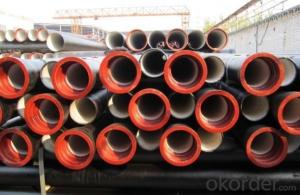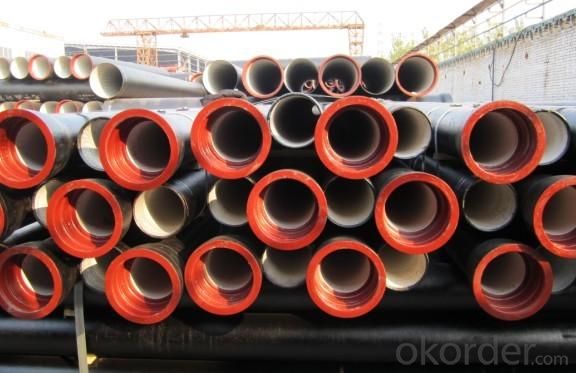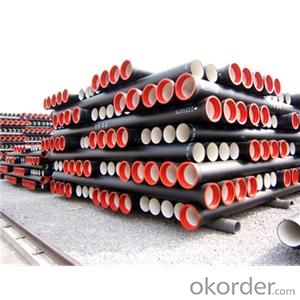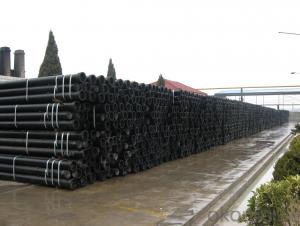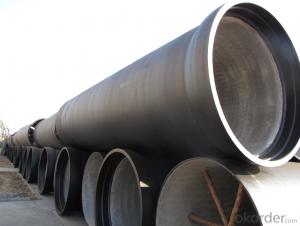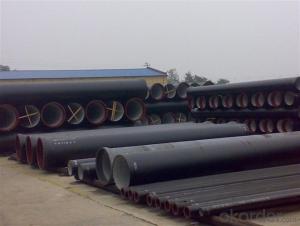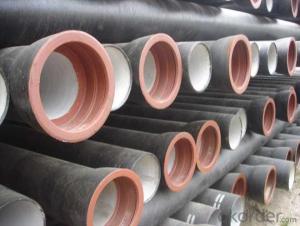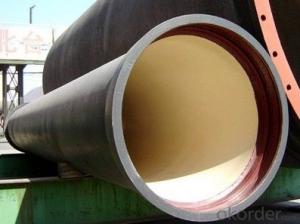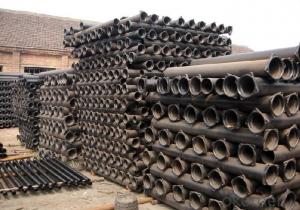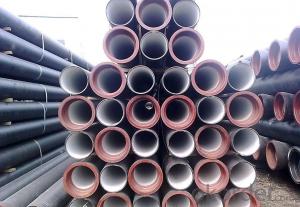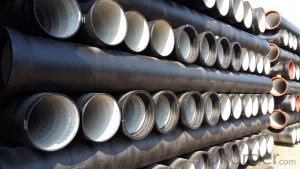Ductile Iron Pipe of China DN300-DN900 EN598 C40 On Sale
- Loading Port:
- China main port
- Payment Terms:
- TT or LC
- Min Order Qty:
- 20 m.t.
- Supply Capability:
- 100000 m.t./month
OKorder Service Pledge
OKorder Financial Service
You Might Also Like
1,Ductile Iron Pipe Description :
1) Pipes confirm to ISO2531,K9 class,T type joint,6m long,with inside cements lining conform to ISO4179, outside Zinc spraying(130g/m2) and bitumen coating(70μm) conform to ISO8179.
2) Pipe ends: Spigot and socket ends, with 100% SBR rubber gaskets accoding to ISO4633
3) we can do third party inspection according to customer's request.
4) Our products have been sold to many international market,such as Middle East and South East Asia and Africa.
2,Main Features of the Ductile Iron Pipe:
·High yield strength
·High tensile Strength
·High corrosion resistance
·Pressure Resistence
·Anti-corrosion
·Installation is convenient
·Satisfy the highest hygienic standards
3,Ductile Iron Pipe Images:
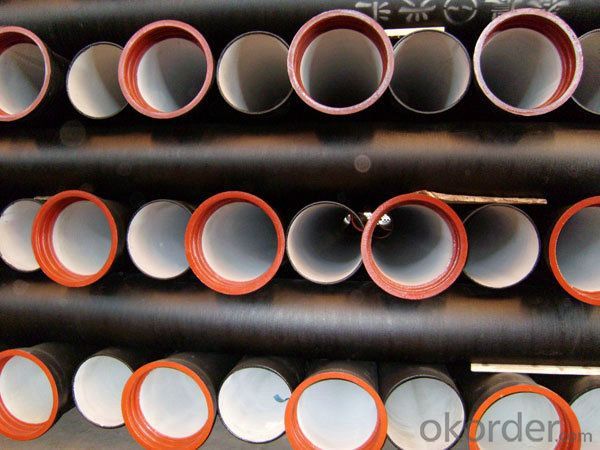
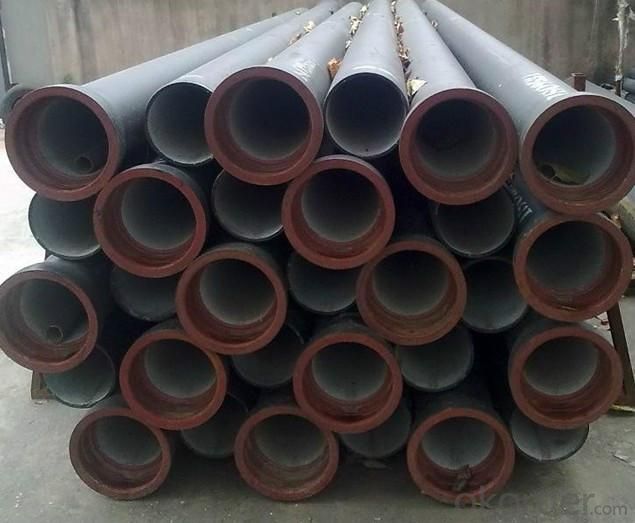
4. Ductile Iron Pipe Specification
Quick Details
Place of Origin: China (Mainland)
Model Number: DN80-1600 Length: 6M/5.7M/NEGOTIATED Standard: ISO2531 / EN545
Application: Potable/Sewage Water
Diameter: DN80-1600
Shape: Round
Hardness: 230 Pipe
Wall Thickness: standerd
Pull Strength: 420
Yield (≥ MPa): 300
Material: Ductile Iron water ductile iron pipe: SO2531 / EN545 DI pipe
Packaging & Delivery
Delivery Detail: 30-45 days
ductile iron pipe:
1. DN80-DN1600mm (T-Type, Class K9)
2.effective length 6m/pc
3.comply with ISO2531/EN545/EN598
5.FAQ:
We have organized several common questions for our clients,may help you sincerely:
1.Q: Why would you choose ductile iron pipe rather than other pipe materials?
A:The reasons are obvious for that not only ductile iron pipe possesses the inherent strength and flexibility of ductile iron, combined with proven corrosion protection systems, but also the cost savings can be achieved from design to installation and commissioning.
2.Q:Why can you guarantee the inner of pipes can’t be corroded?
A: High alumina cement mortar lining and sulphate-resistant cement mortar lining. These two special linings are applicable to inner anti-corrosion for sewage pipes, improving resistance to erosion of the sewage components.
- Q: What are the lubricants for the installation of ductile iron pipes for tap water?
- Lubricant used to reduce frictional resistance of friction pairs and to retard wear of lubricating medium.
- Q: Can ductile iron pipe be used for bridge crossings?
- Ductile iron pipe is suitable for bridge crossings due to its strength, durability, and flexibility. Its high tensile strength enables it to bear heavy loads and vibrations, making it ideal for supporting bridges and withstanding traffic weight. Moreover, the pipe's flexibility allows it to absorb movements and deformations caused by temperature changes, settling, and other factors, minimizing the risk of structural damage and ensuring the bridge crossing's longevity. Additionally, the pipe's resistance to corrosion makes it a dependable choice for bridge crossings exposed to moisture, chemicals, and other corrosive elements. Overall, ductile iron pipe possesses properties that make it a reliable and appropriate material for bridge crossings.
- Q: What are the typical joint restraint requirements for ductile iron pipes?
- Ductile iron pipes typically require joint restraints to prevent separation or pulling apart. Two common types of restraints are mechanical joint restraints and push-on joint restraints. Mechanical joint restraints are used when the pipe faces high internal pressures or external loads. They consist of a gland and a follower gland that are tightened around the joint with bolts or clamps. This secures the joint and prevents movement. On the other hand, push-on joint restraints are used when the pipe doesn't face high pressures or loads. They provide a seal and prevent separation due to ground movement or external forces. Push-on joint restraints are installed by pushing the pipe into the joint and securing it with a ring or collar. In addition to joint restraints, proper bedding and backfill materials are important for ductile iron pipes. These materials help distribute loads and provide stability, further enhancing the pipe's resistance to joint separation. It's important to note that the specific joint restraint requirements may vary depending on project specifications, pipe size, and operating conditions. Therefore, consulting the manufacturer's recommendations and engineering standards is essential for selecting and installing the proper restraints.
- Q: Can ductile iron pipes be used for irrigation of sports fields?
- Yes, ductile iron pipes can be used for irrigation of sports fields. Ductile iron pipes are known for their strength, durability, and flexibility, making them an ideal choice for various applications, including irrigation. These pipes have high resistance to external pressures and impact, which is beneficial for sports fields that may experience heavy foot traffic and potential damage. Additionally, ductile iron pipes have excellent corrosion resistance, ensuring long-term performance and minimal maintenance. Their smooth interior surface also allows for efficient water flow, preventing clogs and ensuring adequate irrigation for the sports fields. Overall, ductile iron pipes are a reliable and suitable option for irrigation systems in sports fields.
- Q: Are ductile iron pipes suitable for use in industrial applications?
- Yes, ductile iron pipes are suitable for use in industrial applications. They have excellent strength and durability, making them ideal for transporting water, chemicals, and other fluids in industrial settings. Ductile iron pipes are also resistant to corrosion, which is crucial for maintaining a long lifespan in industrial environments. Additionally, their flexibility and ease of installation make them a cost-effective choice for industrial applications.
- Q: How to control mortar proportioning in ductile iron pipe cement coating
- The calculation steps are: first to calculate the amount of plastering engineering (area), and then check the "national construction basic quota" quota in the corresponding amount of mortar project, engineering quantity multiplied by the amount of mortar that fixed amount of mortar, the mortar amount multiplied by the corresponding mix ratio of mortar, the consumption of raw materials can be obtained.
- Q: Are ductile iron pipes suitable for use in hydroelectric dams?
- Hydroelectric dams benefit from the suitability of ductile iron pipes. Ductile iron, a more flexible and stronger type of iron compared to traditional cast iron, is an ideal option for various applications, including water transmission systems in hydroelectric dams. Ductile iron pipes possess durability and resistance to corrosion, which is essential in the continuous water exposure environment of a dam. They can endure high pressures and extreme temperatures, making them fitting for the demanding conditions within hydroelectric dams. Moreover, ductile iron pipes exhibit excellent joint integrity, guaranteeing their leak-proof and reliable performance throughout their lifespan. This aspect is crucial for maintaining the efficiency and effectiveness of a hydroelectric dam's water transmission system. Additionally, ductile iron pipes prove to be cost-effective when compared to materials like steel or concrete. With a long service life, minimal maintenance requirements, and easy availability, they present a practical choice for hydroelectric dam projects. In conclusion, ductile iron pipes are a viable option for hydroelectric dams due to their durability, corrosion resistance, high-pressure tolerance, joint integrity, and cost-effectiveness. They provide the necessary strength and flexibility to efficiently transport water within the dam, contributing to the overall success and longevity of the hydroelectric power generation system.
- Q: Can ductile iron pipe be used for marine and offshore applications?
- Yes, ductile iron pipe can be used for marine and offshore applications. Ductile iron is known for its high strength and durability, making it suitable for various demanding environments, including marine and offshore applications. It has excellent corrosion resistance, making it resistant to the corrosive effects of saltwater and other harsh conditions found in marine environments. Additionally, its ductility allows for flexibility and resistance to cracking or fracturing under high-pressure conditions. These properties make ductile iron pipe a reliable choice for transporting fluids and gases in marine and offshore industries, including offshore oil and gas platforms, marine structures, and underwater pipelines. It is important to note that proper coating and cathodic protection systems should be employed to further enhance the corrosion resistance of ductile iron pipes in marine and offshore applications.
- Q: What are the different lining materials available for ductile iron pipe?
- Ductile iron pipes have multiple options for lining materials, which serve to safeguard the pipes from corrosion and prolong their lifespan. Some commonly used lining materials are as follows: 1. Cement Mortar Lining: This lining comprises a layer of cement mortar applied to the inner surface of the pipe. It serves as a durable and smooth barrier against corrosion, making it a popular choice for water and wastewater applications. 2. Polyethylene Encasement: In this method, the pipe is wrapped with a layer of polyethylene film. This lining delivers excellent protection against corrosion and is frequently employed in aggressive soil conditions. 3. Polyurethane Lining: Polyurethane lining is a spray-applied substance that forms a seamless and flexible barrier within the pipe. It offers exceptional resistance to chemicals and abrasion, making it suitable for applications involving aggressive fluids. 4. Epoxy Lining: Epoxy lining is widely chosen for lining ductile iron pipes due to its outstanding resistance to corrosion and chemicals. It is typically applied as a liquid coating that cures to form a protective and smooth layer. 5. Zinc Coating: Zinc coating, also known as galvanizing, involves applying a layer of zinc to the external surface of the pipe. This lining provides corrosion resistance and is commonly utilized in outdoor and exposed applications. These diverse lining materials offer distinct advantages and are selected based on the specific requirements of the application. Factors such as the nature of the transported fluid, environmental conditions, and expected service life play a crucial role in determining the most suitable lining material for ductile iron pipes.
- Q: Are ductile iron pipes suitable for use in residential plumbing?
- Ductile iron pipes are indeed a suitable choice for residential plumbing. This material, known for its strength and durability, is resistant to corrosion, making it highly advantageous for plumbing systems. With its remarkable tensile strength, ductile iron pipes can endure high pressure and are less prone to cracking or breaking, unlike other materials. Moreover, these pipes are renowned for their extensive lifespan, lasting over 100 years, guaranteeing reliability in residential plumbing systems. Furthermore, ductile iron pipes exhibit exceptional flow characteristics, ensuring efficient water distribution throughout the entire household. In conclusion, the strength, durability, and corrosion resistance of ductile iron pipes render them a fitting and long-lasting solution for residential plumbing needs.
Send your message to us
Ductile Iron Pipe of China DN300-DN900 EN598 C40 On Sale
- Loading Port:
- China main port
- Payment Terms:
- TT or LC
- Min Order Qty:
- 20 m.t.
- Supply Capability:
- 100000 m.t./month
OKorder Service Pledge
OKorder Financial Service
Similar products
Hot products
Hot Searches
Related keywords
